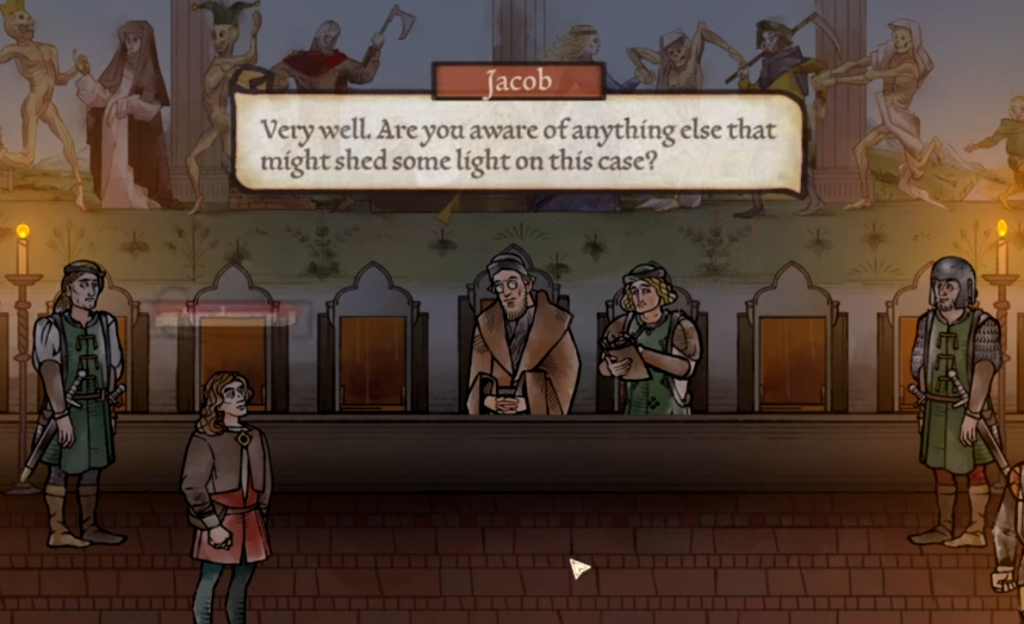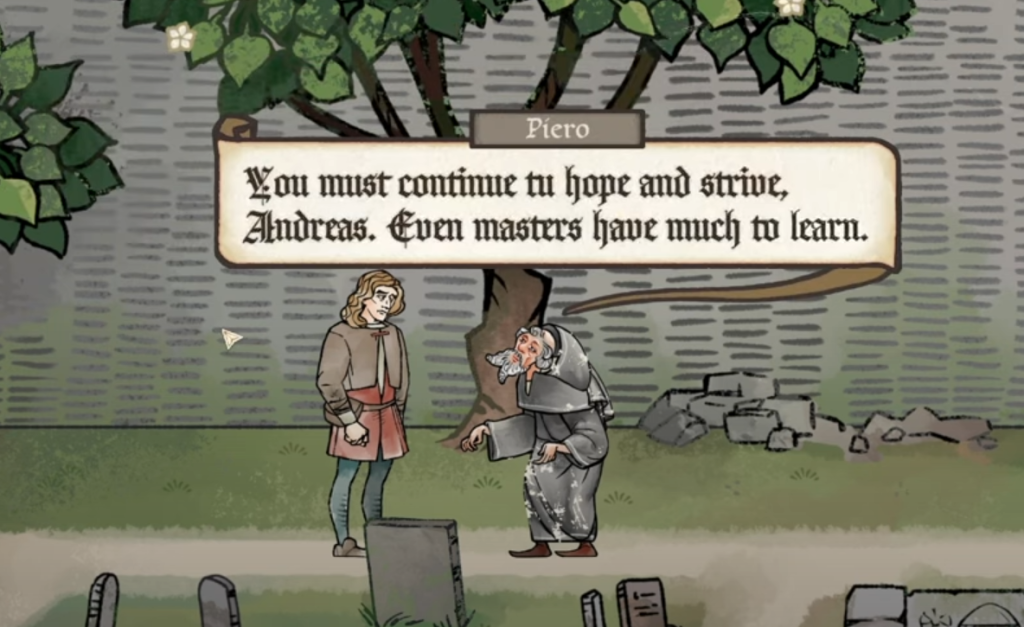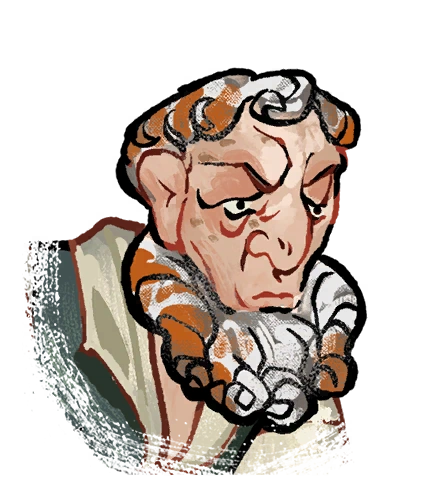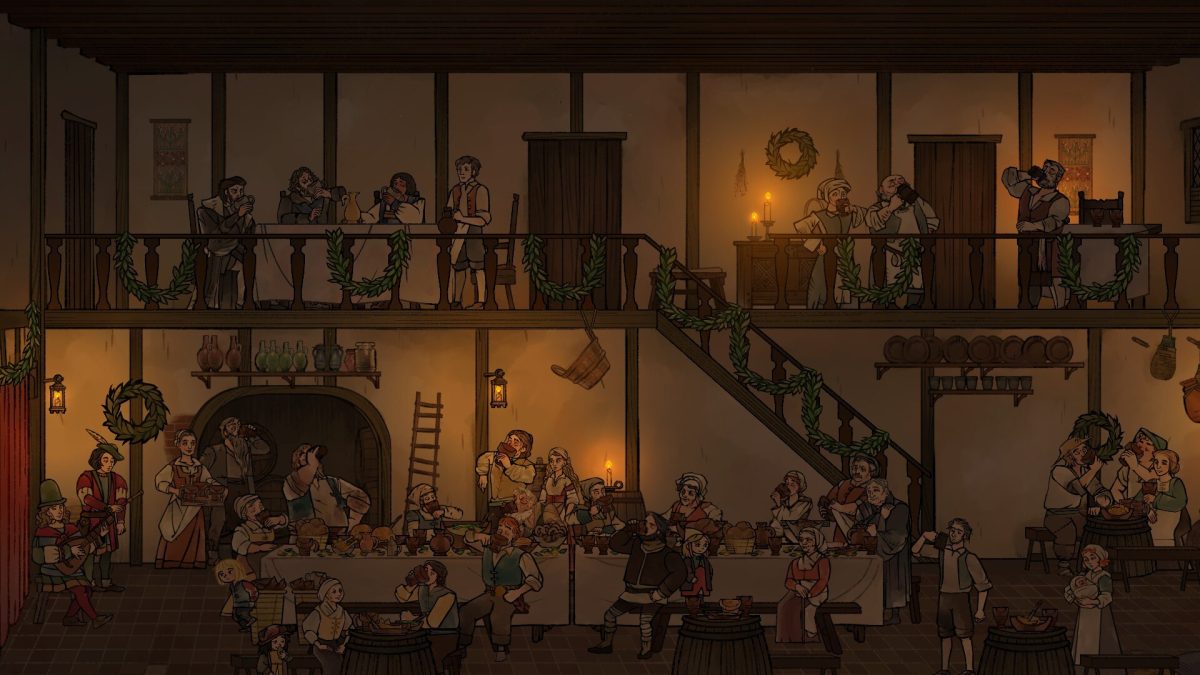Pentiment is a special game. The game’s central mystery and how it plays out is cool, but not what makes it special. What makes it special is that the story’s periphery is filled with dozens of fully realized characters that make the tiny town of Tassing feel like a very real place. By the end of the game, I had a real love for dozens of villagers–side characters at best–more than some games’ main characters. Naturally, when there are a lot of things I care about, I’m gonna rank them.
This list is inspired by Keitha Sims-Korba’s Top Ten list for The Gamer, which if you’re here you might be interested in reading. I originally intended this to be a ranking of all of the dozens of the villagers, brothers, and sisters of Tassing, but who has time for that. Hopefully someone. Note I’m counting Kiersau Abbey residents as villagers.
Massive spoilers follow.

Dishonorable Mention:
Lenhardt Müller
I wrote this list just for an excuse to disparage this man.
This guy. Just look at him. You knew he was going to be a POS the moment you saw his portrait, didn’t you? In a Town where there’s a person responsible for the deaths of seven people, this guy is still obviously the worst.
He’s a village villain because, as miller, he has a monopoly over the peasants’ ability to turn their crops into marketable goods and he extracts all he can with that power. He’s a family villain because he abuses and cheats on his wife and passes on those values to his son. All of this makes him sure that he’s superior, and like so many other cruel and pathetic men, incorrectly believes all men to be secretly cruel and pathetic like he is. And then he kills Ulrich.
The worst part of the game is that we are deprived of seeing his funeral, which I assume looked something like this (wife and son included):

#RIPBOZO
Dishonorable Mention: Father Thomas
Obviously the snake of the Town–the one who actually caused so much of the suffering in Tassing–deserves a dishonorable mention. He caused the deaths of a half-dozen people and manipulated the faith of another such that she will now be cursed with guilt for the rest of her life. But that he is awful goes without saying. What should be said as that his whole reason for breaking bad is incredibly stupid.

He killed all those people to stop them from discovering that the Saint Moritz that the Town considered so integral to its existence was actually the roman god Mars, and the proof was under their feet. But the thing is that people just don’t deconstruct their beliefs like that. People do not shirk long and closely-held religious beliefs simply because some evidence comes about which could cause some part of the narrative to be questioned. Even the game has examples of people questioning the details of the Saint Moritz story without it affecting them.
Not that this raison d’etre is somehow bad writing or not believable, it is quite believable. But it’s a projection of his own lack of faith and how easily his conviction could be shaken. I don’t think the villagers would have their faith in the church shaken by finding out about the statue of Mars Pater. But what could cause the Town’s faith to be shaken would be its central and closest religious figure being responsible for the most traumatic events the Town had suffered in recent memory.

Honorable Mention: Andreas Maler
I recognize it’s a little strange to have the game’s main character be a “villager” and an “honorable mention.” But I consider him a villager because (1) you don’t play as him in Act 3 and (2) he joins the village for real after the game ends. And he’s an “honorable mention” because he’s good but…he’s got issues.
Different players can play him different ways, and mine generally tried to be a good man. He flirted with Sister Zdena but didn’t move further, generally tried to be kind, paid the peasants taxes, played hide-and-seek with the village children. And of course, he saved Brother Piero and tried to protect Magdalene. He was a very good man to the village.
But this game is one of the best at showing how important and good it is to take care of your family. As a man, his wife is especially dependent on his income and existence to simply get by in the world. And when he faced the loss of his son (which she also faced), he ran and left her behind. Then when the library burned, he ran permanently. Luckily, the worst didn’t happen to her and she didn’t lose the estate. Hopefully she went on to live a good life. But that was no thanks to Andreas.
Honorable Mention: Jacob Estler
Oh boy no oh no the Archdeacon is coming. Oh no. Jacob Estler’s approach is treated as a great intimidation. The eye of the Prince-Bishop of Friesing is about to fall upon this tiny sleepy town.

Luckily, the Prince-Bishop’s top cop is an honest, perceptive and courageous investigator. When Andreas surprisingly accuses a powerful church official of a heinous crime, Jacob sees the logic immediately and accepts the evidence without resistance. And when Andreas provides evidence of a conspiracy, the results are inconclusive, until later we learn that the evidence of conspiracy continued to bother him for decades. It is no surprise that he later had the necessary intellectual independence to join the Lutherans.

Despite limited interactions, he might have made my top 10…but he’s not a villager.

10. Ulrich Alban
I’m gonna be real with you, I did not fully appreciate this man in my playthrough. It took reading Keitha Sims-Korba’s rankings to make me realize that this man is actually a champ–feeding the poor and being one of the few to side with the peasants in the uprising.
I’m gonna blame this on him having resting evil face. Doesn’t he look like a scrooge?
9. Sister Gertrude
One of the strengths of Pentiment is how the depth of small characters comes through in normal interactions.

In her interactions, Sister Gertrude showed a sense of duty, acceptance of others, genuine care for the Town and all of its residents, and an unflappable spirit. She and Sister Margarete (below) made visiting the convent a pleasure.

8. Sister Margarete
The blind nun put a spell on me. Margarete played some parts in some events, sure–helping sus out where Brother Guy was hiding the money, getting bumped into by the devil (?)–but what endeared me to Sister Margarete is her spirit.
I wish I could explain why I like her so much, but it’s just the nuances in how she was written. I was always happy to start a chat with her.
7. Claus Drucker
Of course Andreas’ BFF and Magdalene’s father would be on my top ten. Not only was he a good father and good friend to Andreas, but he helped the peasants print their literature for their cause (despite himself not being able to read).


6. Otto Zimmerman
Otto, like his son, could sometimes be a little shit. An annoying agent for good. But he was a good friend and incredible leader. He could not read, but clearly had great intelligence and an strong intuition.
In Act 2, Otto is the de facto leader of the peasant revolt. As leader, he speaks eloquently, weaving in many ideas into the cause against the Abbey. And he does so without forgetting that he’s representing the Town, calling them to speak up themselves and responding reasonably to their fears of authoritarian reprisal. His death is the most important event in recent Tassing memory. Truly great work.

As a leader that isn’t book smart, but is well-skilled has an intuition for a crowd and understanding of political dynamics, he reminds me of another character from a totally different property that I loved this year: Cassian Andor from Andor. Watch Andor please.
5. Magdalene Druckeryn
Obviously this is a weird one because she’s the player character for Act 3. But she’s a highly skilled artist, an independent tradeswoman at a time I’m guessing it wasn’t very common. Every other tradesman in the Town is a man. But everyone accepts her–she’s Claus freakin’ Drucker’s daughter. She can get it done. And she does.

She painted the mural. The mural that caused me to well up with tears. Why did I tear up? What an incredible, indescribable moment. That alone gets her top 5.

4. Brother Piero
Andreas’ artistic Mentor was a man out of time and out of place. An artist looking to cast a light on reality, while working as a monk in the establishment of authority.
What really endeared me, like with others characters, he how he talks to Andreas and the others around him. Giving wise and measured advice to Andreas, takings criticism from powerful people in stride, and maybe most importantly, being a foil to the truly terrible Brother Guy. The enemy of my enemy is my friend, and it helps that he’s also my friend.

3. Sister/Mother Illuminata
Like many of the other nuns, Mother Illuminata has deep sense of duty and kindness. She has also an incorruptible nature that somehow makes her seem more leadership-worthy when she allows rules to be broken. She recognizes and lives in darkness and chaos and is well-equipped to steer the convent in stormy seas.

The early sequences where she and Andreas bond over their shared love of books by entering the pages of the book are possibly the most striking in the entire game. And in this sequence she exposes her depth of understanding of her place in the world and the place of women in fiction. She is not afraid to say it because she is not afraid of this piddly artist. I get the sense she could crush Father Gernot if she wanted to.


2. Vácslav
I didn’t get a great sense of what Vácslav is like, as I didn’t see him as Andreas in Act 1. But his conversation with Magdalene in Act 3 about transubstantiation and the Eucharist was maybe my favorite part of the whole game.
When I was little, my Dad (a Jew turned born-again Christian) used to assign me bible passages to read and report back on my conclusions. It was boring but I learned things. In college I majored in history, resulting in me learning about the Councils of Nicaea. And I read the Da Vinci Code (please hush). I once told a group of lawyers that if I were picking a religion with a blank slate, I would pick Catholicism because they have a lot of rules and having a bunch of weird rules would appeal to me.
To put it lightly, talking about whether believing in transubstantiation made taking the Eucharist at communion into a satanic ritual is extremely my jam. I don’t follow any set doctrine because I can’t believe in anything unless it feels like it has a consistent internal logic. The process of trying to instill an internal logic into a religious belief system is incredibly interesting to me. I’m a freak.

Rest in peace, you were burned too early.
1. “Ill Peter” Gertner
By any objective measure, Ill Peter is the winner of Pentiment. In a Town where death is a specter that hangs over daily life and can take anyone at any time, this old man persists. He’s one of the first people you run into in the game, when you’re a young master. He’s already a sick old man. 25 years later he’s still alive. Incredible.

Helping his ranking is that he is a sole source of forbidden Town knowledge. The only one left to remember the old ways. He’s stubborn enough to stick to the old ways but not so stubborn as to be angry that the new ways exist. He splits the “lovable old grouch” uprights right down the middle.
He was officially designated Tassing’s longest-lived resident. So it’s official: Ill Peter is the GOAT.

Leave a Reply